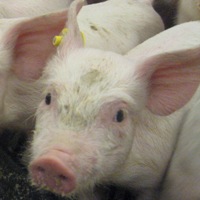Niche markets offer opportunities for pork

More and more consumers, no longer content to eat conventional pork, are looking to purchase meat developed through more selective niche markets.
In response, University of Nebraska-Lincoln Extension is helping pork producers learn more about niche markets, said Richard Ness, extension educator focusing on niche pork. In general, niche pork markets require a fatter pig than is grown in conventional systems, giving it a different eating quality, he said.
Consumer demand
“The growth in the alternative swine production systems comes from consumer demand for alternatives to commodity pork products,” Ness said. “These are consumers who have different values that they want met by the pork products they buy.”
Consumer demand
“The growth in the alternative swine production systems comes from consumer demand for alternatives to commodity pork products,” Ness said. “These are consumers who have different values that they want met by the pork products they buy.”
The niche or designer pork industry is based on creating a different product before the animal reaches the processing plant, Ness said. These differences include giving the animal no antibiotics, hormones or animal by-products, not confining it in gestation or farrowing crates, and following animal welfare recommendations.
For many people, pork developed through niche markets represents quality, Ness said. “Niche pork is not going to take over the pork industry. But there are a lot of people who read ‘bon appetit’ magazine and shop at Whole Foods Market. It’s a certain segment of the population but they’re serious about where their food comes from,” he added
Niman ranch
Most of Nebraska’s niche pork farmers sell their animals to Niman Ranch, a niche food business that has a pork processing plant in western Iowa. Klint Stewart, Nebraska’s field agent for Niman, estimated there are about 40 active niche pork farmers in the state who sell their pork to Niman.
Dean Janousek of Clarkson, who has been raising hogs for about 30 years, is one of them. Janousek said he wouldn’t be in the business if it wasn’t for the niche pork market because it is the most profitable for a small 25-sow operation such as his.
“If we didn’t have this specific market I would not be raising hogs,” he said, explaining that he gets about 62 cents a pound for live hogs in niche production as opposed to about 50 cents in the conventional market.
Janousek refuses to use farrowing crates for his 25 sows, believing that his animals need room to stand up and lay down. He does not use antibiotics and also raises the popular Berkshire breed, which he said has a better flavour. “I get the satisfaction of raising some of the best pork in the country,” he said.
Value issue
Hog farmers get involved in the niche pork industry for several reasons, Ness said. It is often a value issue – they believe this is the proper way to raise pigs. Some have raised their pigs this way for years and now they have a market for it.
For others, niche markets usually provide a floor price for the hogs which reduces the financial risk in a falling market, he said. Plus, the cost of getting started raising pigs for niche markets is considerably less than starting a conventional system because gestation crates and other equipment are not needed. “This makes niche pork attractive to younger, beginning farmers,” Ness said.
Click here for the free Pig Progress newsletter
Dean Janousek of Clarkson, who has been raising hogs for about 30 years, is one of them. Janousek said he wouldn’t be in the business if it wasn’t for the niche pork market because it is the most profitable for a small 25-sow operation such as his.
“If we didn’t have this specific market I would not be raising hogs,” he said, explaining that he gets about 62 cents a pound for live hogs in niche production as opposed to about 50 cents in the conventional market.
Janousek refuses to use farrowing crates for his 25 sows, believing that his animals need room to stand up and lay down. He does not use antibiotics and also raises the popular Berkshire breed, which he said has a better flavour. “I get the satisfaction of raising some of the best pork in the country,” he said.
Value issue
Hog farmers get involved in the niche pork industry for several reasons, Ness said. It is often a value issue – they believe this is the proper way to raise pigs. Some have raised their pigs this way for years and now they have a market for it.
For others, niche markets usually provide a floor price for the hogs which reduces the financial risk in a falling market, he said. Plus, the cost of getting started raising pigs for niche markets is considerably less than starting a conventional system because gestation crates and other equipment are not needed. “This makes niche pork attractive to younger, beginning farmers,” Ness said.
Click here for the free Pig Progress newsletter











